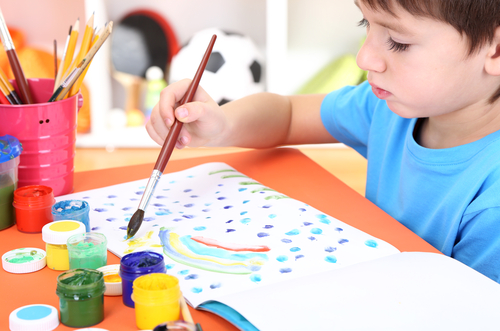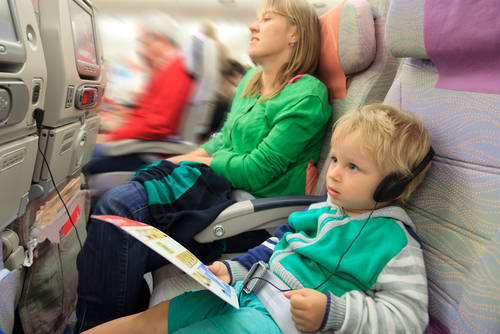Major Family Holidays
 Major holidays come with a long
school break, but other important family holidays like Thanksgiving, or
Hanukkah sometimes come with only a little or no time off from school.
Major holidays come with a long
school break, but other important family holidays like Thanksgiving, or
Hanukkah sometimes come with only a little or no time off from school.
No matter how much time you have to celebrate the holiday,
the important thing to keep in mind is that holidays live on in kids' memories
forever. So, it's best to take advantage of a holiday period. Don't be
remembered as being chained to your computer or absent for the holidays. Kids
will remember holiday fun, so make sure you have some!
Work ahead or take vacation days to ensure your presence
during family holidays. If you do have to work over the holidays, keep work
contained to certain times and places (out of sight), and give the kids your
full attention when you are doing holiday activities.
Family Vacation Survival Guide
 Children love vacations.
Not because they get to go to Disney World or some other place they've
idealized in their minds, but because of a much richer treasure. Usually,
parents are more relaxed, more fun, more emotionally available. It's common for
kids to say that their favorite summer memory is something free and simple,
like lying on a blanket looking at the stars with the family. These sweet
pleasures are the golden experiences that shape rich childhood memories.
Children love vacations.
Not because they get to go to Disney World or some other place they've
idealized in their minds, but because of a much richer treasure. Usually,
parents are more relaxed, more fun, more emotionally available. It's common for
kids to say that their favorite summer memory is something free and simple,
like lying on a blanket looking at the stars with the family. These sweet
pleasures are the golden experiences that shape rich childhood memories.
Kids also love vacations with extended family.
They follow the older cousins around like puppies, and forge lifelong bonds
with the kids their own age. These visits often shape their memories of
grandparents and provide a sense of heritage.
But vacation can also be stressful.
Kids often stay up late, get disconnected from parents, and melt down from the
overload. This malady can be referred to as Family Vacation Stress Syndrome. Of
course, parents often experience their own version, whether from extended
family tensions or logistical pressures. So the first rule for a restful
vacation is to find a way to come to peace with your own issues!)
Even if it's just your own family on a vacation you've all looked forward to,
the disrupted schedules, traveling, and the crash and burn from all the
excitement can easily be a recipe for tears and tantrums. How can parents
manage life during vacations to maximize the joy and minimize the tears?
 1. Give kids plenty of
warning about travel and upcoming events
so they feel less pushed around and frightened of the unknown. Before
traveling, you might make a little book to show them what will happen each day.
(“Then we leave for
Grandma’s, where you’ll get to play with all the cousins.”) It
doesn't have to be fancy -glue photos to loose-leaf paper, and put them in a
3-ring binder. Many kids love to draw a picture of what will be happening each
day to add to your book. This helps them both enjoy the anticipation and
conquer any fears. And seeing smiling faces in advance helps them warm up more
quickly to relatives they don't see often.
1. Give kids plenty of
warning about travel and upcoming events
so they feel less pushed around and frightened of the unknown. Before
traveling, you might make a little book to show them what will happen each day.
(“Then we leave for
Grandma’s, where you’ll get to play with all the cousins.”) It
doesn't have to be fancy -glue photos to loose-leaf paper, and put them in a
3-ring binder. Many kids love to draw a picture of what will be happening each
day to add to your book. This helps them both enjoy the anticipation and
conquer any fears. And seeing smiling faces in advance helps them warm up more
quickly to relatives they don't see often.
 2. Coach your kids about the social behavior you expect.
Role play with them in the car before you arrive, or make a game of it before
you go:
2. Coach your kids about the social behavior you expect.
Role play with them in the car before you arrive, or make a game of it before
you go:
- “In the hotel hallways, we use inside voices and we don't run.
Why do you think that is?"
- "What do you when Uncle Norman wants to hug you hello?”
-
- “What if you don’t like the dinner that’s served?”
- “When you want to leave the table, how do you ask?”
- "The airplane is like a flying village with everyone close
together, so there are special rules to be safe and considerate. Let's see if
we can guess what they are... It can be hard to stay in your seat...what do you
think you could do on the plane if you get bored?"
- “What will you do if the cousins start arguing?”
3. Keep kids on their usual schedule as much as possible. Kids need the security of familiar routines.
They’re stressed by unfamiliar events and what feels to them like chaotic
unpredictability. Do what you can to keep them on schedule and be patient
when they get hyped-up or irritable.
 4. If you’re flying with
kids, plan to arrive early enough that they get to “run” a bit in
the airport hallway after sitting still in the car and before sitting still on
the plane. DON'T pre-board -- your child will just have to sit longer in
his seat. Make sure to change diapers and use the bathroom just before
boarding. If you use overnight diapers (more absorbent), you might get
lucky and avoid diaper changes on the flight. Bring small wrapped
“presents” – books, treats, lip balm, puzzles, simple crafts – for each
child. Kids can look forward to getting one as soon as they’ve buckled
their seat belts, and several more whenever you need a distraction
mid-flight. Blue painter's tape always comes in handy, too -- you
can make a tic-tac-toe board on the tray table, use it for crafts,
tape up blankets around his seat to make a cozy fort, and even make a hopscotch
board in the airport while you're waiting. Be sure to bring bottles,
sugar-free lollipops or something else to suck on during take-off and landing
if your child isn't nursing.
4. If you’re flying with
kids, plan to arrive early enough that they get to “run” a bit in
the airport hallway after sitting still in the car and before sitting still on
the plane. DON'T pre-board -- your child will just have to sit longer in
his seat. Make sure to change diapers and use the bathroom just before
boarding. If you use overnight diapers (more absorbent), you might get
lucky and avoid diaper changes on the flight. Bring small wrapped
“presents” – books, treats, lip balm, puzzles, simple crafts – for each
child. Kids can look forward to getting one as soon as they’ve buckled
their seat belts, and several more whenever you need a distraction
mid-flight. Blue painter's tape always comes in handy, too -- you
can make a tic-tac-toe board on the tray table, use it for crafts,
tape up blankets around his seat to make a cozy fort, and even make a hopscotch
board in the airport while you're waiting. Be sure to bring bottles,
sugar-free lollipops or something else to suck on during take-off and landing
if your child isn't nursing.
5. Plan no more than one
event per day. What you want to avoid, of course, is racing
around before you leave, getting stressed out by a busy trip that includes lots
of meltdowns, and returning home in need of a vacation. Kids tend to get
cranky and stressed with travel and schedule changes, so plan to do less.
You'll all enjoy it more.
6. Have age-appropriate
expectations. A four year old
can’t be expected to sit quietly while you enjoy a fancy dinner. If
you’re doing a lot of visiting with adults, be sure the kids have something to
occupy them. If they can read, buy them a new book for the occasion, one they
can’t wait to get into. If they’re too young to stay absorbed in a book, bring
a dvd. Even if you usually have dinner as a family, vacations are a great time
to feed kids early so adults can enjoy a chance to talk at dinner. Remember,
you need to recharge your own batteries, too!
 7. Snuggle
with your child every morning before
getting out of bed. It's very grounding for kids to connect with you and
review how the day is expected to unfold -even if it will be a lot like yesterday.
7. Snuggle
with your child every morning before
getting out of bed. It's very grounding for kids to connect with you and
review how the day is expected to unfold -even if it will be a lot like yesterday.
8. Schedule in some quiet decompression time every night. Bring some favorite,
comforting books from home. 9. Make sure
you have nightly quiet time after lights out to lie with your child and listen
to him/her chat about the day. Ask about their favorite thing today, the
worst thing, and what they're looking forward to tomorrow. This is when you'll
hear about minor conflicts or insecurities that your child is working to handle
with the other kids. Don't feel you have to jump in and "solve" the
problem – your child mostly needs a chance to be heard and have his/her
feelings acknowledged, so s/he can figure out how to advocate for him/herself.
10.
Physical Activity- Be sure your schedule includes plenty of
visits to the playground or other opportunities for the kids to get wild.
11.
Down time. Kids need
downtime, just to chill out, snuggle, and do whatever relaxes them. If they
don’t get it, they can’t really be blamed for melting down when the
over-stimulation gets to them.
What does your child do at home to relax?
Draw? Play with her imaginary friend? His little figurines?
Make sure every day includes a little downtime with your child's favorite
activity to help him regroup.
 12. Soothing activities for little ones that work for most kids:
12. Soothing activities for little ones that work for most kids:
- Sand
play – Put some sand in a lasagna pan on the deck, add small figurines,
vehicles, and a strong spoon for digging.
- Water
play - At the beach or lake, of course. But even on a back deck
with a spaghetti pot of water. For variety, add ice cubes, paint brushes,
sponges, plastic water pitchers. Toddlers love to "paint" the deck or
wash the picnic table.
- Bubbles.
You'll have to help the little ones, but all kids love bubbles. You can
easily make your own bubble mix (Add 3 Tbsp of Glycerine and 2/3 cup of liquid
dish soap to a gallon of water.) Any twig with a loop of yarn can be used
as a bubble wand.
- Clay-
If you're in a rented space on vacation, limit clay to a tray, pan, or
outside. But clay, (Playdoh) is a wonderful, tactile way for kids to
knead and pound out the stresses that inevitably accompany all new experiences.
13.
Watch your kids’ food intake in the midst of too many treats and hyped-up
schedules. Many tantrums originate from hunger. And all
parents recognize the sugar high that sends kids bouncing off walls and then
crashing into tears. If necessary, speak with grandparents in advance about
limiting treats. And carry small protein-rich snacks with you so your child
doesn’t have a melt-down while the adults are negotiating where to go to
dinner.
14. Time
with you. Your kids may be
chasing the older cousins, but they still want, and need, time with you.
This is a perfect opportunity to turn off your cell phone and see what an
inspired parent you are when you have a chance to relax and revel in just being
alive. Just want to lie under the umbrella with your magazine? Make that
your reward after you spend five minutes in the water with your child. You'll
be amazed how much more connected to your child you will feel after a five
minute water fight and how much more cooperative your child is when you say
it's time to go home.
15. Look at this vacation as a chance to recharge and reconnect
your family.
Try
not to work on vacation - this is family time. Forgo
organized evenings in favor of family board games and keep your focus on having
fun rather than sight-seeing or structured activities.
16. The most important tip,
as always in parenting, is to manage yourself so you can stay calm.
Remember that traveling can be stressful for everyone, and your kids depend on
you not only to regulate their environment, but also to help them regulate
their moods. Make sure you take this opportunity to trade off child care
responsibilities with other adults, if possible, so you get a chance to
replenish your own spirits. You're never too old to have a vacation
you'll always remember.


